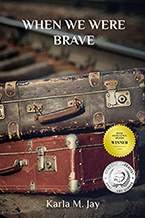April 6, 2020
When We Were Brave
Karla M. Jay
Book Circle Press (2019)
ISBN: 9780578477077
World War II Novel Wins Tyler R. Tichelaar Best Historical Fiction Award
 This year, I am thrilled to announce that Karla M. Jay’s novel When We Were Brave has won the Tyler R. Tichelaar Best Historical Fiction Award in this year’s Reader Views Literary Awards. This is truly one of the finest novels to win the award in the ten years I have been sponsoring it. I found myself completely engrossed in the characters and learning some unsavory new details about World War II.
This year, I am thrilled to announce that Karla M. Jay’s novel When We Were Brave has won the Tyler R. Tichelaar Best Historical Fiction Award in this year’s Reader Views Literary Awards. This is truly one of the finest novels to win the award in the ten years I have been sponsoring it. I found myself completely engrossed in the characters and learning some unsavory new details about World War II.
When We Were Brave takes readers into the middle of World War II and the motivations behind why people make different decisions to protect human lives. Jay’s weaving together of three separate stories keeps the reader continually interested in the characters and events. Short chapters continually move the story forward until all the characters are brought together in a shocking but satisfying conclusion.
Often when authors weave together various storylines, I find myself having a favorite storyline and wanting to get back to it when reading the other storylines, but that was not the case with When We Were Brave. All three groups of characters held my constant interest. The most remarkable story is probably that of Wilhelm Falk. Falk is a German and a member of the SS; however, he only joined the SS because he was recruited by other members who were plotting to bring down Hitler. After several failed assassination attempts by the SS, Falk finds himself in Italy in November 1943, when the novel opens. He now decides to put on the clothes of a dead German soldier of lower rank so he can be taken prisoner and sent to the U.S. Once there, he intends to tell people what he knows about Hitler’s forces and open the world’s eyes to the atrocities of the concentration camps he has witnessed.
Offsetting this story is that of the Muellers, a German-American family in Pennsylvania. When the Muellers’ neighbors begin to harass them and accuse them of being German sympathizers and spies, the family has no place to turn. Law enforcement will not help, and when the FBI shows up, the family quickly finds they are suspected spies whose civil liberties will be denied.
And then there is Izaak Tauber, a little boy in the Netherlands. His father is Jewish and has been taken away by the Nazis. Although his mother is Catholic, she knows the Nazis will eventually also come for her and Izaak. Mother and son go into hiding but eventually are captured and endure one concentration camp after another. Through it all, Izaak barely understands the war; he only hopes that one day they will be taken to the camp where his father is.
In the end, Jay connects all the stories. More importantly, she reveals how very difficult it is to be a decent person in the midst of evil. Falk is forced to watch atrocities being committed, knowing he cannot speak against them if he wishes to live. He writes letters to numerous officials and organizations outside of Germany to ask for help, but his letters go ignored. Even when he reaches the United States, he is suspected to be a spy and has a difficult time getting anyone to listen to him. The author’s note at the end reveals that Falk is based on a real person.
I was most appalled by how the Mueller family was treated. I knew Japanese-Americans had been sent to US concentration camps, but I found it almost unbelievable—though it’s true—that German-Americans were also placed in the equivalent of such camps; in fact, Ellis Island, which had welcomed immigrants to this nation, becomes such a place for the Mueller family.
The novel also informed me of the extent of Hitler’s propaganda. When the German prisoners of war arrive in the United States, they first see the Statue of Liberty and think it must be a fake copy because they’ve been led to believe Germany bombed New York and destroyed it, but as they approach the harbor, they realize New York is still standing and they have been lied to.
I was also surprised that the Muellers are given the option by the US government to be deported to Germany and exchanged with American prisoners there. That a German-American family would choose to return to Germany in the middle of a world war was hard to believe, but such situations did happen, and after the way the Muellers are treated, I couldn’t blame them for going, even as they trust that eventually the United States will let them return.
Although not a happy novel, When We Were Brave provides the reader with a deeply satisfying, cathartic experience—a sign of truly great storytelling. The reader is also left with a new understanding of how quickly people’s rights can be taken from them. It is inconceivable that in the United States decent people like the Muellers can lose their rights because of their ethnic background, yet similar situations still happen today.
I highly recommend When We Were Brave. It may provide new insight into World War II for readers and will haunt them long after they turn the last page.
For more information about Karla M. Jay and When We Were Brave, visit http://www.karlajay.com.
— Tyler R. Tichelaar, PhD and award-winning author of Narrow Lives and When Teddy Came to Town

